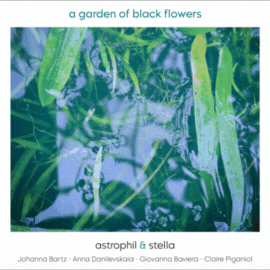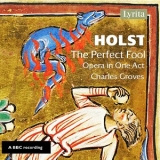Gustav Holst komponierte nicht nur die Musik, sondern schrieb auch das Libretto zu seinem Einakter The Perfect Fool. Die vorliegende, über 50 Jahre alte Monoaufnahme der BBC ist die einzige Einspielung im aktuellen Katalog. Allerdings gibt es etliche Aufnahmen der Ballettsuite aus The Perfect Fool.
Die Musik ist sehr illustrativ und fällt durch Anleihen bei Verdi und Wagner auf, die Holst angeblich persiflierend einsetzte.
The Perfect Fool wurde am 14. Mai 1923 im Royal Opera House, Covent Garden, unter Eugene Goossens uraufgeführt.
Die komisch-satirische Oper beginnt mit einem Ballett der Geister von Feuer, Wasser, Erde und Luft, das der Zauberer bestellt hat. Er schläft dabei ein. Eine Mutter kommt mit ihrem Sohn, einem Tor, vorbei. Sie sind auf dem Weg zum Palast der Prinzessin. Auf der Wanderschaft berichtet die Mutter von einer alten Prophezeiung, laut der ihr Sohn mit seinem Blick eine Braut gewinnen und den Feind töten werde und mit einem einzigen Wort erreichen soll, wozu kein Mann vorher im Stande war.
Im Palast der Prinzessin, die auf der Suche nach einem Mann ist, versucht der Zauberer mit einem Zaubertrank jung und schön auszusehen. Doch die Mutter des Tors tauscht den Zaubertrank gegen Wasser aus. Die Prinzessin, die sich von Höflingen, jungen Mädchen und einem Troubadour unterhalten lässt, hat inzwischen ein Auge auf den Tor geworfen.
Nun zaubert der Zauberer einen Wald herbei und lässt ihn in Flammen aufgehen. Mit einem einzigen Blick kann der Tor den Brand jedoch löschen. Der Zauberer gibt sich geschlagen. Die Prinzessin ist inzwischen noch mehr beeindruckt von dem jungen Mann und fragt diesen, ob er sie zur Frau nehmen möchte. Doch dieser will davon nichts wissen.
Die BBC-Aufnahme ist etwas trocken im Klang und stellt die Stimmen sehr in den Vordergrund. Die Sänger bieten durchwegs akzeptable Leistungen und das Orchester spielt akkurat. Dass allerdings mehr in der Musik steckt als Charles Groves herausholt, haben einige Interpretationen der Ballettsuite gezeigt. Dennoch: wer sich für Holst oder die britische Oper interessiert, wird diese Produktion interessant finden. Die CD-Box enthält einen ausführlichen Einführungstext sowie das ganze Libretto.
Gustav Holst not only composed the music, but also wrote the libretto for his one-act opera The Perfect Fool. This mono recording by the BBC, over 50 years old, is the only release in the current catalog. However, there are quite a few recordings of the ballet suite from The Perfect Fool.
The music is very illustrative and is notable for borrowings from Verdi and Wagner, which Holst supposedly satirized.
The Perfect Fool was first performed on May 14, 1923, at the Royal Opera House, Covent Garden, under Eugene Goossens.
The comic-satirical opera begins with a ballet of the spirits of fire, water, earth, and air ordered by the magician. He falls asleep during it. A mother passes by with her son, a fool. They are on their way to the palace of the princess. As they wander, the mother murmurs an old prophecy to herself that her son will win a bride with his gaze, kill the enemy with a glance, and achieve with a single word what no man has been able to do before.
In the palace of the princess, who is looking for a husband, the sorcerer tries to look young and beautiful with a magic potion. But the fool’s mother exchanges the potion for water. Meanwhile, the princess, who is entertained by courtiers, young girls and a troubadour, has her eye on the fool.
Now the wizard conjures up a forest and makes it burst into flames. With a single glance, however, the fool can extinguish the fire. The wizard admits his defeat. Meanwhile, the princess is even more impressed by the young man and asks him if he would like to take her as his wife. But he refuses.
The sound of the BBC recording is dry and places the voices very much in the foreground. The singers give acceptable performances throughout and the orchestra plays accurately. That there is more to the music than Charles Groves brings out, however, has been shown by some interpretations of the ballet suite. Still, anyone interested in Holst or British opera will find this production interesting. The CD box includes a detailed introductory text as well as the entire libretto.

























